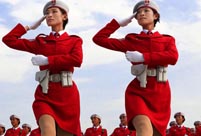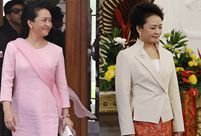 Close-up view of August Aerobatic Team
Close-up view of August Aerobatic Team
 Goddesses married in 2014
Goddesses married in 2014
 Polar region photos raise worldwide awareness of global warming
Polar region photos raise worldwide awareness of global warming
 Get off at the last stop — Beijing Subway in vision
Get off at the last stop — Beijing Subway in vision
 Top 100 beauties in the world!
Top 100 beauties in the world!
 Gallery: Who is the most beautiful one?
Gallery: Who is the most beautiful one?
 If you like autumn, put your hands in the air!
If you like autumn, put your hands in the air!
 Fan Bingbing's "Queen style" in new play
Fan Bingbing's "Queen style" in new play
 Lingerie show at 2014 Miss China
Lingerie show at 2014 Miss China
 J-10 fighters show aerobatic stunts in smog-free sky
J-10 fighters show aerobatic stunts in smog-free sky
Hong Kong police on Thursday cleared away the Occupy Central protest encampments in Admiralty. The clearance in general went smoothly and peacefully. A number of protesters were arrested without resistance. This doesn't mean that the opposition against the Hong Kong political reform plan incited by radical students and the opposition camp has come to an end, but indicates Hong Kong has safeguarded the bottom line of the rule of law.
Discontent within society and the opposition's ambition to revamp basic political rules, as well as Western instigation are prerequisites for a color revolution. Although conditions appeared ripe in Hong Kong, Occupy Central is different from the revolutions that swept across Egypt and Ukraine.
The central government's resolution of not making concessions to radical forces in Hong Kong determined the trajectory of the Hong Kong situation.
Street politics can easily ravage a society and are addictive to some members of the public. The allure of revolution lies in the interruption to a depressing social order and creating the illusion that upheaval could bring about a change of life.
It's difficult to convince all social members that revolution always comes at a high cost, one which the public will eventually pay for.
Those who believe unlimited democracy is the solution to a deluge of social conundrums in Hong Kong are also waxing nostalgic for colonial rule under Britain, when there was no democracy at all. This is a paradox.
Hong Kong needs systematic development. The central government is unable to cater to Hong Kong's requests one by one; it can only serve as a strong hand at the helm, preventing the region from falling into a subversive state. Hong Kong is supposed to be more independent than most inland cities.
Which is more important to avoiding a color revolution, addressing internal problems or preventing subversion by external forces? The answer is contentious. But theoretically, we have to focus on internal issues.
Different stages of social development have different problems. It takes time to solve problems. In most cases, the Chinese government can solve a similar problem quicker than its foreign counterparts, but it still frustrates the Chinese public who pins high expectations on the government.
We firmly oppose the notion that society can be overhauled through street violence. This is a key political principle. On one hand, the principle gains great popularity among the public, but on the other, a group of forces attempts to violate it.
It's harder to keep a gigantic society which accommodates over 1 billion people far from turmoil and chaos than it is to maintain China's rapid economic development.
There are varied views on how to maintain political stability. China needs to upgrade its problem-solving capabilities through reform; meanwhile, the public should have realistic expectations about the government. Society should also reach a consensus on anti-street politics. These are three crucial pillars to underpin China's long-term security and stability.
(For the latest China news, Please follow People's Daily on Twitter and Facebook
 20 years on: Relocated Three Gorges residents through lens
20 years on: Relocated Three Gorges residents through lens PLA HK Garrison veterans leave behind beautiful smiles
PLA HK Garrison veterans leave behind beautiful smiles Representative beauties of each province in China
Representative beauties of each province in China Chestnut girl goes viral online
Chestnut girl goes viral online Victoria's Secret Fashion Show
Victoria's Secret Fashion Show In photos: Bright and brave female soldier of PLA
In photos: Bright and brave female soldier of PLA China's charming first lady
China's charming first lady Excellent photos of Zhuhai Air Show
Excellent photos of Zhuhai Air Show China's heavyweight aircraft
China's heavyweight aircraft An old problem
An old problem Despite torture report, US escapes censure
Despite torture report, US escapes censure  Inflation hits five-year low
Inflation hits five-year low Runaway brides
Runaway bridesDay|Week|Month